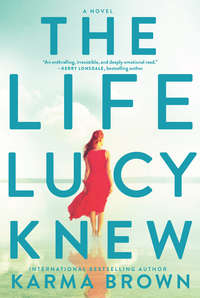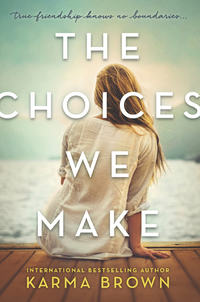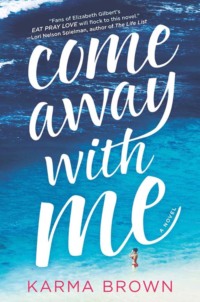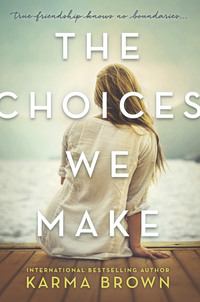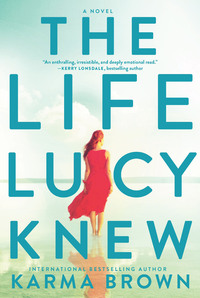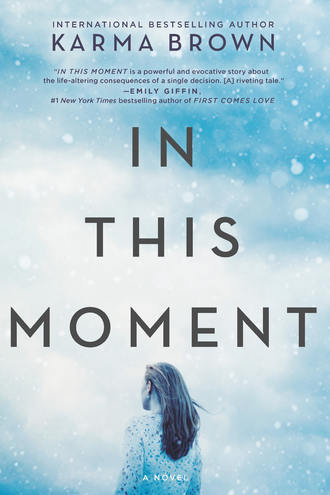
Полная версия
In This Moment
“Oh? That’s too bad. There must be something going around.” I clear my throat, which now feels like it’s filled with razor blades, hoping I have ibuprofen in my purse.
Audrey asks if I’ve booked the parental driver’s education class Ryan and I need to attend before Audrey can start driving. She’s been asking about it daily for the past week now that her sixteenth birthday (and the day she can get her learner’s permit) is less than a month away. I tell her I have, even though I’ve only left one voice mail, yesterday, and am not officially registered. Satisfied with my answer, she then tells me about Human Pudding—a band she and her friends love whose songs give me a headache—releasing a new album, and about how one of her teachers, who apparently no one likes much, wore white pants that showcased her black-and-pink polka-dotted underwear. Hearing this makes me grateful I never became a high school teacher. Teenagers, at least the ones I know, are fairly ruthless in their judgment of grown-ups—as though your time to make mistakes ends the moment you turn twenty-one and are labeled as an adult. Though I try to listen and respond appropriately, my mind is already past the car ride and school drop-off and on to my work to-do list and what dish I’m going to make for the cookbook club night I’m hosting on the weekend. Soon Audrey is back to her buzzing phone, and I’m lulled into the soft sounds of the car’s interior, and I jump when she speaks again.
“So you’ll pick me up after school, right?”
“Can’t you just walk home?” I turn to her, confusion on my face.
“Mom, seriously—”
I lean toward her and kiss her cheek, closer to her ear than mouth—protecting her from whatever virus I have—and laugh. “Seriously. I’m joking. I’ll be here. Promise.”
“Stick to your day job, Margaret,” she says, but gives me a sweet smile that makes my heartbeat jump, like it so often does when I’m in her presence. A feeling I expect is impossible to describe except to other mothers. “Love you,” she says, leaning over to hug me tight. I hold her until she lets go, like always. “See you at three-thirty. Don’t be late.”
I go to say I’ll be there, I know the time thank-you-very-much and won’t be late because I set a reminder on my phone in between brushing my teeth and pulling on my tights, but my words are cut off by the slam of the car door and she’s off, swallowed up in the tide of teenagers flowing into the open mouth of the school’s front doors.
* * *
Between arguing with Tom about removing the garden statues—we settled on leaving the more tasteful ones and storing the others—late clients, and a snapped heel on my favorite shoes, thanks to a loose walkway stone at my first showing, the day drags painfully by. Plus, I’m feeling at least 150 percent worse than I did this morning, my voice now deep and rough and my fever making me alternate between chills and sweats. So by the time my last appointment arrives, which I pushed up so I could get Audrey in time for the dentist, I’m operating on fumes and desperate for things to go smoothly. I pop a Claritin while I wait for my clients, adding it to my grocery list on my phone when I see the blister pack is nearly empty. I’ve had a dog and cat allergy since I was a kid, and have learned through experience to never go into a house showing without Claritin onboard.
My clients, Noah and Jillian Delacorte, are a young couple, new to Merritt by way of Boston where they’ve been living for the past three years in a one-bedroom condo. With a baby on the way, they’re “ready to move to the ‘burbs,’” as Noah said when we first chatted, and I gladly agreed to work with them. Parents-to-be are generally on a tight timeline to get moved in, as no one wants to be dragging a fussy newborn around to a bunch of showings. However, it’s been two months and a dozen showings later, and we have yet to find them the perfect house. Mostly because Jillian—a pixie of a woman, whose seven months pregnant belly is smaller than mine was at three months—is fairly particular about, well, everything, as it turns out. She once walked right out of a house because the front hallway smelled “a bit earthy,” and she thought that meant mold, despite my assurances it was likely due to the giant potted plant by the front door.
So today, while I wait shivering with fever at a house I’m certain ticks all the boxes, I pray to the real estate gods that Jillian Delacorte is in a ready-to-buy state of mind. However, turns out my shitty day wasn’t done with me yet, and so when Noah shows up without Jillian—the decision maker of the two—I’m a bit concerned. Being the decision maker of the two, it’s critical she be here.
“Hi, Noah.” I shake his outstretched hand as he walks up to me. I look toward his car, hoping Jillian will somehow materialize from inside it. “Where’s Jillian?”
“She wasn’t feeling well, so I told her to stay home.” Noah adjusts his messenger bag on his shoulder, looks toward the house. “She said she trusts my judgment.” I smile weakly at him, both of us knowing how false this statement is.
The house is perfect for them—it’s within budget, has the required three bedrooms, a fenced-in backyard and, by some miracle, both the master bedroom on the main floor and the butler’s pantry Jillian insisted upon—but unfortunately with only Noah here, I know I won’t be writing up an offer tonight.
“I think this may be the one, Meg,” Noah says, after we tour the house. “But I want Jillian to see it, just to be one hundred percent certain.” Of course. So we run through our calendars at the home’s kitchen table and try to find a date that works.
With only a few minutes to spare until I have to get Audrey I sit in my running car—Audrey would have a fit, reminding me how terrible it is for the environment—and return a call to another client who’s having second thoughts about the asking price we agreed on, then with my final minute craft an email to Tom about an idea I have for the agent’s open house. While I’m typing, a text comes through from Ryan. Sorry about this morning. Can I make it up to you later? I quickly type back, Deal and am about to sign off on the email to Tom when my cell phone whistles.
“What the hell?” On top of the screen a little calendar reminder pops up.
Mom—Leave work NOW.
I chuckle. She must have programmed the reminder into my phone this morning, probably while I raced around trying to do an hour’s worth of stuff in fifteen minutes.
After I hit Send on the email to Tom, I pull away from the curb hoping there’s no traffic downtown, so I can get Audrey to her appointment on time and avoid the receptionist’s wrath.
3
I’m only three minutes behind schedule when I pull into the long pickup queue to wait for Audrey. I quickly check my phone, feeling relief when I see replies from both Noah—Jillian is excited to see the house, how does Thursday work?—and Tom, who has had a change of heart and agrees perhaps all the statues should go, though he words the email in a way that makes it seem it was his idea all along. Clearly things have taken a turn for the better, and even my fever seems under control with the ibuprofen I’ve been popping all day.
I see Audrey come through the doors, looking for my car in the long pickup line, and I put down the passenger window. “Audrey!” I try to shout, though it comes out sounding more like a squeak. I would honk, but that’s frowned upon in the school parking lot. Audrey still hasn’t seen me, but Emma Steen, waiting for her own daughter, Charlotte, by the front doors, does. I bristle as Emma strides toward me, cursing today’s timing.
She tightens the belt of her Burberry-patterned coat around her tall, slim body and steps toward the passenger side of my car and the open window. “Oh, hell,” I mutter, trying to decide if I have time to pick up my phone and fake a call. Emma’s smiling as she approaches, but I notice it’s strained. As it should be, I think.
“Hi there, Meg,” she says, bending down so her face is framed by the window. Her auburn hair is pulled back in a tight, high ponytail, her smooth bangs hanging perfectly upon her forehead, showcasing fabulous eyebrows. I absentmindedly rub a finger over my own brows, knowing it’s been too long since I had them waxed. My fingers itch with the urge to type a reminder to call the spa into my phone.
“How are you? Sorry you missed the last meeting, but hopefully the minutes were helpful.” I think of Emma’s last email, which I deleted without opening. This is her first year as president of Merritt High’s Parent Teacher Organization, and it’s the perfect position for her—some people lead through creativity or inspiration, but Emma relies on her Martha Stewart–like tendencies and homemade chocolate chunk cookies.
I wish I could put up the window without it appearing downright rude, and imagine with some satisfaction what it would be like to catch her nose between the glass and the steel frame of the door. Instead I nod, force a smile and silently beg Audrey to hurry up so we can get out of this damn queue.
“I can’t chat, Emma. Audrey has a dentist appointment. Oh, and here she is.” I move my purse off the passenger seat for Audrey, who has thankfully just opened the car door, having squeezed around Emma.
“Hi, Audrey,” Emma says, shoving her hands in her pockets and watching Audrey as she buckles her seat belt. “How’s the tennis these days?”
“I don’t play anymore,” Audrey says, her tone polite but not inviting more questions. Audrey’s a natural athlete, like her dad, and used to play tennis and soccer, but when she turned twelve she decided she didn’t care for the competitive nature of organized sports. She still hits balls with her dad on occasion, but her interests have shifted: to journalism, environmentalism, saving the backyard birds.
“Oh?” Emma holds on to her wide smile, though I can see it faltering. I know Emma still feels a connection to Audrey, having spent so much time with her when she was young, but Audrey has all but forgotten that relationship and treats her no differently than any other adult she’s forced to converse with—polite, but revealing little.
“Well, I can see you’re in a rush,” Emma says, even though we both know I’m going to be stuck here for another few minutes until the line moves again. “But maybe we can do coffee soon?” She smiles brightly as though this is a normal thing we do, a perfectly reasonable suggestion. I don’t bother to remind her that we haven’t had a coffee together in about six years and instead point to my watch. “We have to go,” I say. Perhaps she thinks this passage of time is long enough for things to thaw between us, but after what she did, Emma and I will never have another coffee date—even though we used to be best of friends, seeing each other daily when our girls were in elementary school.
“Absolutely. Off you go.” She pushes the air in front of her like she’s shoving water out of the way in a pool, walking backward toward the school as she does, still forcing that bright smile. “Don’t want those beautiful teeth to be late!” She gives a final wave to Audrey, then tucks her hands back into her coat pockets as she turns around.
Audrey—who was too young to understand the abruptness with which my relationship with Emma ended, and who has long since forgotten how she and Charlotte used to tell everyone they were twin sisters—looks at me and rolls her eyes. I mutter, “Be nice,” as I put up the window and move ahead another car length.
I hate how flustered I still get whenever I see Emma, each time remembering what happened six years ago. When I walked into my kitchen to restock the ice bar during our annual New Year’s Eve bash, warm with celebration and a few nips of champagne, to see Emma and Ryan standing too close. Emma’s lips were on Ryan’s, but with his arms like wooden planks at his sides, his body rigid and disengaged, it was clear he wasn’t a willing participant—which he vehemently reinforced after I physically threw her out of my house.
“You’re one to talk,” Audrey says, raising her eyebrows at me, clearly referencing my thinly veiled dislike of Emma.
“Well, she’s...exhausting.” It’s the kindest comment I can offer as I settle back into my seat. Right or wrong, Ryan and I have always adopted the team approach to our family, meaning Audrey has participated in adult conversations since she was a little girl. I’ve only regretted it once, when Audrey announced proudly, and loudly, when she was four years old—during a library reading group for moms and tots—that a man puts his penis in a woman’s vagina to make a baby. Always curious, we had the day before read The Book of Life and had some graphic—particularly for her age—conversations about how babies came to be. That was our last parent and tot library visit.
“How was school?” I ask, pulling out of the pickup roundabout, trying to shake off the Emma annoyance that has settled into my shoulders.
“Good,” Audrey says, and I know that’s probably all I’ll get for now. Years ago I read an article in some parenting magazine that said to never, ever, ask your child a question that had a yes or no response. So I used to think up all sorts of clever ways to mine her for information with open-ended questions, but after a few months I realized I usually got more and better information if I let her tell me in her own way.
“I didn’t even know my phone could whistle at me. Did you know that?” I ask, a smile on my face, turning on to the main road.
Audrey grins at me, then looks out her window. “I know how busy you are, Mom. Just wanted to help.”
“Thank you, baby.” I rub her legging-covered knee. I slow for the first speed bump in a series of three, my car’s shocks groaning as we crest it.
“Hey, there’s Jack.” Audrey points a half a block ahead, to a tall, blond teenager, crouched down at the curb, tying his shoelaces. “His dad took Sam to the clinic, so I guess no ride home for him today.” Jack and Sam Beckett are identical twins and look so much alike I’ve never been able to tell them apart.
“I guess his mom is still at work?” I ask. Alysse Beckett, the boys’ mother, is a financial whiz and works at one of Boston’s most-respected private equity firms, drawing a salary that, when I sold them their current house, resulted in my best commission check ever. Their dad, Andrew, is a bit of a legend among the stay-at-home moms, having quit a journalism career when the twins were born to stay home with them.
“Sam said she’s working on something big right now and goes to work before six in the morning and stays until, like, midnight sometimes.” Audrey takes out a stick of gum, folds it into her mouth. “I never want a job where I have to work that early or stay that late,” she adds. I don’t bother bursting her bubble—she’ll figure out soon enough getting up early and working late are fairly basic parts of being an adult. I slow down for the final bump, practically coming to a full stop.
Jack stands and bounces on his tiptoes on the curb’s edge, skateboard in one hand, impatiently waiting for the car coming toward me to pass so he can cross. His shorts hang low on his hips and land just below the knee the way all the boys seem to be wearing them these days. On his head is a red baseball cap, turned backward, with large earphones—the noise-canceling kind—circling his neck.
I look to the other side of the road and see a couple of other teen boys, skateboards also in hand, clearly waiting for Jack to catch up.
“We should let him cross, Mom,” Audrey says.
I press my foot firmly on the brake, completely stopping the car. “You know, they look so much alike,” I say. “I don’t know how you tell who’s who.”
Audrey waves at Jack, and he waves back and smiles, recognizing her. “It’s the hair,” she says.
“What is?” I ask.
“How I tell them apart,” Audrey replies. I hold my hand up and wave Jack across the otherwise empty road, toward his group of friends. He smiles in acknowledgment and sets his skateboard on the pavement. “Sam’s hair is a bit longer, sort of curling around his ears. See?” Audrey holds up her phone, a picture of her and Sam lighting up the screen. Where he’s tall, she’s a pipsqueak—long-legged like me, but still short for her age; where he’s fair, she’s dark, brown-haired like her dad. In the photo they’re laughing, their faces squished together inside the picture’s frame.
“Cute photo,” I say, picking up my travel mug half full of now cold coffee. I’m about to take a sip when Audrey screams, jolting me. The next sounds I hear are a sickening thump and the squealing of brakes. The mug drops from my hands, and, as the coffee seeps into my lap, I gasp, watching Jack Beckett’s lanky, fifteen-year-old body smash into the windshield of the other car—which came out of nowhere, too fast—and cartwheel into the air like it weighs nothing at all.
4
I’m pushing so hard on the brake pedal my toes start to cramp. Instinctually I withdraw my foot to stop the pain, and the car jerks ahead. It’s only a couple of inches, but Audrey screams again with the jarring movement, and the shrill sound rattles in my head, confusing me. What happened? Did I hit someone? No, no. It wasn’t me. My car was stopped. My foot, hard on the brake.
My eyes dart to my rearview mirror, and I see Jack Beckett lying still on the pavement not far behind us, mostly obscured by a woman on her knees beside him, wearing a Burberry-style trench coat. The coat triggers recognition, but still, I stay buckled in my seat. “This is my fault,” I say, the beating of my heart pounding in my ears, my voice shaking. “I shouldn’t have stopped in the middle of... I shouldn’t have... Where did that car come from?” Audrey cries softly beside me, and I focus on her, murmuring that it’s going to be okay. I quickly turn off the ignition and put the car in Park but don’t unbuckle my seat belt just yet. I think of the bird, broken on my balcony, forgotten in the crazy rush of the morning. I’m terrified to see Jack up close—unfortunately, I know what a body looks like after it has done battle with a car—but am irrationally hoping, as I did this morning with the bird, that he’s simply stunned. He’ll be up and walking it off in a few minutes.
My breath comes too fast, but the influx of oxygen is also bringing back awareness and clarity. Now I hear the shouts and panicked instructions being barked out by a male voice that rises above the others. Someone thankfully taking charge of the situation.
What finally brings me back to the present and spurs me into action is the sound of Audrey gagging. She’s twisted in her seat, straining against her still buckled belt, eyes wild as she stares through our SUV’s back window at Jack. I grab her chin and turn her face to mine, noticing how odd her color is. Gray, like the caulking putty Ryan used to seal the cracks in the garage last winter. “If you’re going to throw up, get out of the car now.” My voice is calm, directive, though it has no power to it.
Regardless, my words reach her. She says nothing but unbuckles her seat belt. Then she quickly opens her door, jumps out and promptly vomits on to the curb, about where Jack was standing only a minute ago. For a moment I’m unsure what to do: my mothering instincts command me to go to Audrey, to rub her back like I have many times before when she’s been sick, but a stronger instinct tells me to get out of the car and go—no, run—to Jack Beckett.
He’s only ten feet or so behind my SUV, on the other side of the road, splayed out like he’s mid-jumping jack. I’m the third person there, joining the trench-coated woman I now recognize as Emma, who must have just started walking home with Charlotte when the accident happened. A man is crouched beside her, talking, I think, to the 911 operator on his phone. I recognize his voice as the barking, take-charge one, but now that I’m closer I can hear how the slight, nervous shake of his body is making his words tremble, as well.
“Yes, he’s breathing. Not conscious...There’s a lot of blood...His head...Okay, okay.” He turns to Emma, who is amazingly in control of herself, despite what’s in front of us. She used to be an emergency room nurse before leaving to stay home with her two children, and I often sought her advice when Audrey had a fever or a cough that wouldn’t leave her little lungs. “We have to try and stop the bleeding.” The man then notices me standing there and hands me his phone. I put it to my ear, not yet seeing the streak of red on it that has now transferred to my hand, my ear, and he stands to take off his sweater. Now that he has moved slightly away from Jack, I can see how much blood there is, and that the knees of the man’s khakis are soaked dark crimson. I unwrap the pashmina from around my neck and hand it to the man. “To help with the bleeding,” I say, my voice quivering with the adrenaline coursing through me. I notice Jack’s ball cap is gone, but the headphones are still around his neck—backward now, so it sort of looks as though he’s wearing a plastic dog collar.
“Hello?” the operator says. “Are you still with me? Don’t hang up, okay?”
“Yes, sorry. I’m here,” I respond, trying to stop my arms from shaking while I hold the phone tight to my ear and listen to her instructions. “She says to apply pressure on the head wound, with whatever we have. But to be careful not to move his neck.” With a nod the man passes his sweater to Emma, who gently places it around Jack’s head, before folding my scarf into neat squares to firmly press against Jack’s skull. Emma takes over, her confident and nimble hands holding the scarf to Jack’s head as she talks softly to him about help being on the way and that he shouldn’t worry, they are going to take good care of him. Her coat is still tightly belted, though now there are splotches of blood mingling with the tan, black and red plaid squares. I have no idea where Charlotte is. Then I realize I have no idea where Audrey is, either.
There are now two lines of cars, one behind my SUV and another behind the white Volvo wagon that hit Jack, curious heads poking out of rolled-down windows, wondering what the holdup is about, the odd honk to get things moving. A crowd has gathered around us, including Jack’s buddies who were waiting for him to cross the road and whose faces betray the horror—a horror I know all too well, the kind you can never erase—of what they just witnessed. They all hold phones to their ears, their panicked voices mingling, so I can’t hear distinct words.
But the onlookers, including Jack’s friends, stay along the periphery of the accident scene. Outside the worst of it, some sharing prayers for this poor young man. I wish to be with them instead of standing in this inner circle, where we are removing clothing as quickly as Jack’s blood is flowing, trying to do something, anything to help. Things feel wildly out of control, a sensation I loathe. The man is now shirtless, his nipples hard with the cool fall breeze, a little pooch of white belly hanging over his belted pants. My own fingers have gone numb with the chill, and I squeeze them tighter around the phone, hoping I don’t drop it.
“Meg,” Emma says, repeating my name when I don’t immediately answer. “Can you untie my coat?” I nod and come behind her, which seems the easiest way to do what she’s asked without getting in the way, and with quaking fingers, I wrestle the knot at her waist, still keeping the phone tight to my ear with the pressure of my shoulder. Emma shrugs off her trench coat with my help—being careful to leave one hand on the clothes on Jack’s head—and tells the man to put it on. He does, without seeming to notice it’s too small. Even though Emma is tall, the black-piped cuffs rise above the man’s wrists by a few inches, and in any other setting I might have laughed at how ridiculous he looks.
A woman from the peripheral circle hands the man in Emma’s coat a thick wad of gauze, a large pressure dressing from a first aid kit in someone else’s car, she says. He hands me my blood-soaked pashmina and his shirt, and he and Emma apply the dressing against Jack’s skull. I don’t realize how hard I’m pressing my scarf and the shirt against my stomach until I try to take a deep breath and feel resistance. I look down and my dove-gray wrap dress is now marked red and brown, damp with Jack Beckett’s blood and the spilled coffee.


